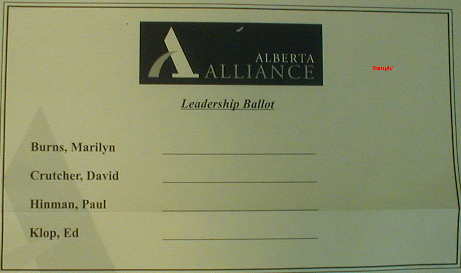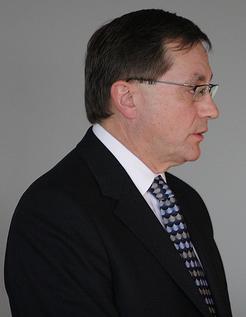|
Alberta Alliance
The Alberta Alliance was a right-wing provincial political party in Alberta, Canada. Many of its members were supporters of the defunct Canadian Alliance federal political party and its predecessor, the Reform Party of Canada. Members also joined from similar provincial fringe parties like the Alberta First Party, the Alberta Party and Social Credit. Alliance supporters tended to view themselves as "true conservatives," and believed the Progressive Conservative governments of Premiers Ralph Klein and Ed Stelmach were out of touch with the needs of Albertans. Paul Hinman was elected the party's leader at a leadership convention held on November 19, 2005. On January 19, 2008, the party voted to change its name to the Wildrose Alliance Party when it absorbed the unregistered Wildrose Party of Alberta. Early history The party was registered on October 25, 2002 and its founding convention was held for two days beginning on February 14, 2003, in Red Deer, Alberta. Former Social ... [...More Info...] [...Related Items...] OR: [Wikipedia] [Google] [Baidu] |
Alberta Social Credit Party
Alberta Social Credit was a provincial political party in Alberta, Canada, that was founded on social credit monetary policy put forward by C.H. Douglas, Clifford Hugh Douglas and on conservative Christian social values. The Canadian social credit movement was largely an out-growth of Alberta Social Credit. The Social Credit Party of Canada was strongest in Alberta, before developing a base in Quebec when Réal Caouette agreed to merge his Ralliement créditiste movement into the federal party. The British Columbia Social Credit Party formed the government for many years in neighbouring British Columbia, although this was effectively a coalition of centre-right forces in the province that had no interest in social credit monetary policies. The Alberta Social Credit party won a majority government in 1935, in the first election it contested, barely months after its formation. During its first years, when led by William Aberhart, it was a radical monetary reform party, at least in t ... [...More Info...] [...Related Items...] OR: [Wikipedia] [Google] [Baidu] |
Progressive Conservative Association Of Alberta
The Progressive Conservative Association of Alberta, often referred to as the Progressive Conservative Party of Alberta, was a provincial centre-right party in the Provinces and territories of Canada, Canadian province of Alberta that existed from 1905 to 2020. The party formed the provincial government, without interruption, from 1971 until the party's defeat in the 2015 Alberta general election, 2015 provincial election under premiers Peter Lougheed, Don Getty, Ralph Klein, Ed Stelmach, Alison Redford, Dave Hancock and Jim Prentice. At 44 years, this was the longest unbroken run in government at the provincial or federal level in Canadian history. In July 2017, the party membership of the PC and the Wildrose Party voted to approve a merger to become the United Conservative Party (UCP). Due to previous legal restrictions that did not formally permit parties to merge or transfer their assets, the PC Party and Wildrose Party maintained a nominal existence and ran one candidate each ... [...More Info...] [...Related Items...] OR: [Wikipedia] [Google] [Baidu] |
Reform Party Of Alberta (1989–2004)
The Reform Party of Alberta is a defunct provincial political party in Alberta, Canada, that was registered with Elections Alberta. Its leader was David Salmon. Early history The party was registered by members of the former Reform Party of Canada on August 24, 1989 not to contest general elections, but to contest elections held by the Government of Alberta to select nominees for the Senate of Canada, a body that is appointed by the Governor General of Canada on the recommendation of the Prime Minister. The party contested Senate nominee elections, the 1989 Senate election and the 1998 Senate election. The Reform Party of Alberta nominated and ran only three candidates in its history: Stanley Waters, Ted Morton and Bert Brown. The other and primary purpose was to keep Reform focused as a federal party instead of being distracted by provincial campaigns. Nonetheless, there was considerable agitation at this time by some Albertan Reform members to form an active provinc ... [...More Info...] [...Related Items...] OR: [Wikipedia] [Google] [Baidu] |
Social Credit Party Of Alberta
Alberta Social Credit was a provincial political party in Alberta, Canada, that was founded on social credit monetary policy put forward by Clifford Hugh Douglas and on conservative Christian social values. The Canadian social credit movement was largely an out-growth of Alberta Social Credit. The Social Credit Party of Canada was strongest in Alberta, before developing a base in Quebec when Réal Caouette agreed to merge his Ralliement créditiste movement into the federal party. The British Columbia Social Credit Party formed the government for many years in neighbouring British Columbia, although this was effectively a coalition of centre-right forces in the province that had no interest in social credit monetary policies. The Alberta Social Credit party won a majority government in 1935, in the first election it contested, barely months after its formation. During its first years, when led by William Aberhart, it was a radical monetary reform party, at least in theory if not ... [...More Info...] [...Related Items...] OR: [Wikipedia] [Google] [Baidu] |
Red Deer, Alberta
Red Deer is a city in Alberta, Canada, located midway on the Calgary–Edmonton Corridor. Red Deer serves central Alberta, and its key industries include health care, retail trade, construction, oil and gas, hospitality, manufacturing and education. It is surrounded by Red Deer County and borders on Lacombe County. The city is in aspen parkland, a region of rolling hills, alongside the Red Deer River. History The area was inhabited by First Nations in Canada, First Nations including the Blackfoot, Plains Cree and Stoney First Nation, Stoney before the arrival of European Saskatchewan River fur trade, fur traders in the late eighteenth century. A First Nations trail ran from the Montana Territory across the Bow River near present-day Calgary and on to Fort Edmonton, later known as the Calgary and Edmonton Trail. The trail crossed the Red Deer River at a wide, stony shallows. The "Old Red Deer Crossing" is upstream from the present-day city. Cree people called the river , which ... [...More Info...] [...Related Items...] OR: [Wikipedia] [Google] [Baidu] |
Wildrose Party Of Alberta
The Wildrose Party of Alberta was a centre-right political organization founded in Alberta, Canada in 2007. The organization took its name from Alberta's provincial flower. On January 19, 2008, the members merged with the Alberta Alliance Party to form the Wildrose Alliance Party. Objectives and philosophy According to a media advisory issued by the party on June 26, 2007, its main emphasis was to be: *"Reducing by constitutional means the enormous net outflow of wealth from Albertans to the federal government" *"Ensuring that provincial decisions better reflect the mainstream values and priorities of most Albertans" *"Ensuring that the party's Leader and MLAs honour their election promises and commitments" According to Don Weisbeck, Mayor of Brooks and Vice President (Communications) for the party, "the provincial government has swayed from its conservative roots. They've become one of the fastest spending and highest taxing jurisdictions in the country compared to their or ... [...More Info...] [...Related Items...] OR: [Wikipedia] [Google] [Baidu] |
Wildrose Alliance Party
The Wildrose Party (legally Wildrose Political Association, formerly the ''Wildrose Alliance Political Association'') was a conservative provincial political party in Alberta, Canada. The party was formed by the merger in early 2008 of the Alberta Alliance Party and the unregistered Wildrose Party of Alberta. The wild rose is Alberta's provincial flower. It contested the 2008 provincial election under the Wildrose Alliance banner, and received seven percent of the popular vote overall but failed to hold its single seat in the Legislative Assembly. Support for the party rose in 2009 when some voters were frustrated with the Progressive Conservative (PC) government. The party won a surprise win by outgoing leader Paul Hinman in an October by-election. In the fall of 2009 the party members elected Danielle Smith as leader, and by December the Wildrose was leading provincial opinion polls, ahead of both the governing PCs, the opposition Liberals and the other parties. Wildrose ... [...More Info...] [...Related Items...] OR: [Wikipedia] [Google] [Baidu] |
2005 Alberta Alliance Party Leadership Election
The Alberta Alliance Party, a conservative political party in Alberta, Canada, held its second leadership election on November 18 and 19, 2005, in Red Deer, Alberta. The leadership position was vacated by Alberta Alliance Party founder and leader Randy Thorsteinson in March 2005. Paul Hinman was elected leader on the third ballot, defeating the other candidates, Marilyn Burns (politician), Marilyn Burns, David Crutcher and Ed Klop. Hinman lead the party from this leadership election to the merge with the Wildrose Party of Alberta in 2008. Election results The election was held using a preferential ballot. Members indicated their preferences in order on the ballot. After each round of voting, the candidate receiving the fewest votes was removed from the election, and his or her votes allocated to other candidates on the basis of the voters' indicated preferences. All members who registered or renewed their memberships before October 6, 2005, were mailed a ballot. Members could mai ... [...More Info...] [...Related Items...] OR: [Wikipedia] [Google] [Baidu] |
Ed Stelmach
Edward Michael Stelmach (; born May 11, 1951) is a Canadian politician who served as the 13th premier of Alberta, from 2006 to 2011. The grandson of Ukrainian immigrants, Stelmach was born and raised on a farm near Lamont and fluently speaks the distinctive Canadian dialect of Ukrainian. He spent his entire pre-political adult life as a farmer, except for some time spent studying at the University of Alberta. His first foray into politics was a 1986 municipal election, when he was elected to Lamont County council. A year into his term, he was appointed reeve. He continued in this position until his entry into provincial politics. In the 1993 provincial election, Stelmach was elected as the Member of the Legislative Assembly (MLA) for Vegreville-Viking (later Fort Saskatchewan-Vegreville). A Progressive Conservative, he served in the cabinets of Ralph Klein—at various times holding the portfolios of Intergovernmental Relations, Transportation, Infrastructure, and ... [...More Info...] [...Related Items...] OR: [Wikipedia] [Google] [Baidu] |
Ralph Klein
Ralph Philip Klein (November 1, 1942 – March 29, 2013) was a Canadian politician and journalist who served as the 12th premier of Alberta and leader of the Progressive Conservative Association of Alberta from 1992 until his retirement in 2006. Klein also served as the List of mayors of Calgary, 32nd mayor of Calgary from 1980 to 1989. Ralph was born and mostly grew up in Calgary, Alberta. After dropping out of High School in grade 11, Klein joined the Royal Canadian Air Force reserves for one year and then attended the Calgary Business College. Klein later worked as a teacher and principal at the Calgary Business College, and later public relations with non-profits. After that, Klein became a prominent local journalist in Calgary where he reported on the challenges of the working class, social outcasts and First Nations, endearing himself to those groups. In 1980, Klein turned his attention to politics and as an underdog was elected Mayor of Calgary, where he oversaw the bo ... [...More Info...] [...Related Items...] OR: [Wikipedia] [Google] [Baidu] |






